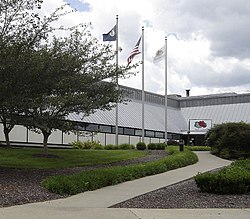Fruit of the Loom
| Corporate logo for Fruit of the Loom. | |
| Company type | Private |
|---|---|
| Industry | apparel |
| Founded | 1851 |
| Headquarters | Bowling Green, Kentucky |
| Products | apparel |
| Owner | Berkshire Hathaway |
| Website | http://www.fruit.com/ |

Fruit of the Loom is an American company which manufactures clothing, particularly underwear. The company's world headquarters are based in Bowling Green, Kentucky. One manufacturing facility still remains in Jamestown, Kentucky, and several other facilities are located across the Southeastern United States, from Louisiana to the Carolinas. Other facilities exist in Canada, El Salvador, Honduras, Europe and North Africa. Until the late 1990s, much of the manufacturing was done in the United States.
Fruit of the Loom is unique in offering an unconditional guarantee on all the products it sells. The brand has significant market share for basic apparel. The familiar logo with the apple, purple grapes, green grapes, currants and leaves is ranked one of the most recognizable trademarks worldwide. The company is a vertically integrated manufacturer.
The company also controls another long-known underwear brand, B.V.D. (Bradley, Voorhees, and Day). Other brands also manufactured and sold by the company are Funpals, Screen Stars and Underoos. Brands once owned or marketed by Fruit of the Loom include Gitano, Munsingwear, Pro Player, and Salem Sportswear.
Hanes and Jockey are the main competitors to Fruit of the Loom [1]
History
The Fruit of the Loom brand dates back to 1851 in Rhode Island when Robert Knight, a textile mill owner, visited his friend, Rufus Skeel. Mr. Skeel owned a small shop in Providence, Rhode Island that sold cloth from Mr. Knight's mill. Mr. Skeel's daughter painted images of fruit and applied them to the bolts of cloth. The ones with the fruit emblems proved most popular. Mr. Knight thought the labels would be the perfect symbol for his trade name, Fruit of the Loom.
In 1871, just one year after the first trademark laws were passed by Congress, Mr. Knight received patent number 418 for the brand, Fruit of the Loom.
Much of its athletic outerwear was sold under the "Pro Player" label, a now defunct division.
The company was part of Northwest Industries, Inc., until NWI was purchased by William F. Farley in 1985 and renamed Farley Industries, Inc.
William F. Farley, the company's former chairman, chief executive officer, and chief operating officer was forced out prior to bankruptcy in late 1999, after having piloted the company into massive debt and unproductive business ventures.
The company was brought from bankruptcy by Berkshire Hathaway Corporation, controlled by legendary investor Warren Buffett, who wanted the valuable brand. He agreed in January 2002 to purchase the company for approximately $835 million in cash. The deal was concluded on April 29, 2002. A condition of the purchase required that former Chief Operating Officer and the then interim CEO, John Holland, remain available to be the CEO for the company. [1]
The company purchased Russell Corporation, effectively taking the former competitor private in a deal that was completed August 1, 2006.
The company announced the purchase of VF Corporation's intimate apparel business for $350 million in cash on January 23, 2007.[2]
Trivia
- The name "Fruit of the Loom" is interpreted by many as a play on words with respect to a part of the Hail Mary prayer: "...blessed art thou amongst women, and blessed is the fruit of thy womb, Jesus." (cf. Gospel of Luke 1:42) The two phrases are unrelated: it is merely a coincidence that "womb" rhymes with "loom".
- From 1996 to 2005, Pro Player once had the naming rights to what is now Dolphin Stadium (originally Joe Robbie Stadium) in Miami, Florida, although it went bankrupt in 1999.
See also
References
- ^ Buffett, Warren (2002-02-28). "Chairman's letter". Berkshire Hathaway. Retrieved 2007-01-23.
{{cite web}}: Check date values in:|date=(help) - ^ "VF Corp. sells intimate apparel unit to Fruit of the Loom". MarketWatch. 2007-01-23. Retrieved 2007-01-23.
{{cite web}}: Check date values in:|date=(help)
Sources
- Related Textile History - Lippitt Mill Retrieved August 27, 2005.
- History of Chicago Retrieved September 13, 2005.
- Farley looks for Congressional help Retrieved September 24, 2005.
- Berkshire Hathaway Announcement of Fruit of the Loom Acquisition Retrieved August 27, 2005.
- Buffett's Berkshire to buy Russell Retrieved January 23, 2007.
